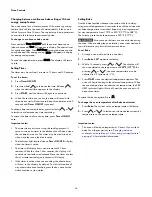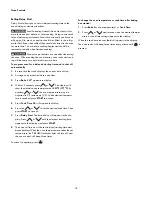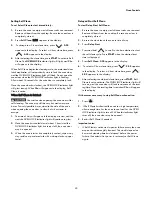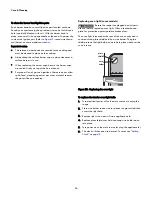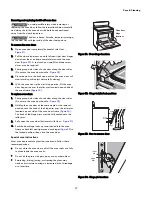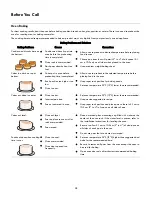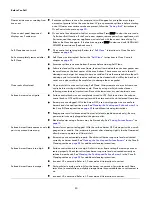
30
Before You Call
Flames inside oven or smoking from
oven vent.
•
Excessive spillovers in oven. For example, this will happen for pie spillovers or large
amounts of grease left on the oven bottom. Wipe up excessive spillovers before starting
oven. If flames or excessive smoke are present, follow the
“Setting Broil”
instructions in
Oven Controls chapter on
page 20
.
Oven control panel beeps and
displays any F code error.
•
Oven control has detected a fault or error condition. Press STOP to clear the error code.
Try Bake or Broil function. If the F code error repeats, remove power from appliance, wait
5 minutes, and then repower appliance and set clock with the correct time of day. Try
Bake or Broil function again. If the fault recurs, press STOP to clear and call 1-800-4-MY-
HOME® for assistance (See back cover).
Self Clean does not work.
•
Oven control not set properly. Review the
“Self Clean”
instructions in Oven Controls
chapter on
page 22
.
Soil not completely removed after
Self Clean.
•
Self Clean was interrupted. Review the
“Self Clean”
instructions in Oven Controls
chapter on
page 22
.
•
Excessive spillovers on oven bottom. Remove before starting Self Clean.
•
Failure to clean soil from the oven frame, the door liner outside the oven door gasket and
the small area at the front center of the oven bottom. These areas are not in the self-
cleaning area, but get hot enough to burn on residue. Clean these areas before the self-
cleaning cycle is started. Burned-on residue can be cleaned with a stiff nylon brush and
water or a nylon scrubber. Be careful not to damage the oven gasket.
Oven racks discolored.
•
Oven racks left in oven cavity during Self Clean. Always remove oven racks from oven
cavity before starting a self-clean cycle. Clean by using a mild, abrasive cleaner
following manufacturer's instructions. Rinse with clean water, dry and replace in oven.
Surface burners do not ignite.
•
Surface control knob was not completely turned to LITE. Push in and turn the surface
control knob to LITE until burner ignites and then turn control knob to desired flame size.
•
Burner ports are clogged. With the burner OFF, use a small-gauge wire or needle to
burner head slots and ignition ports. See
“Cleaning the Cooktop and Surface Burners”
in
the Care & Cleaning section on
page 25
for additional cleaning instructions.
•
Range power cord is disconnected from outlet (electric ignition models only). Be sure
power cord is securely plugged into the power outlet.
•
Electrical power outage. Burners may be lit manually. See
“Setting Surface Burners”
on
page 13
.
Surface burner flame uneven or only
part way around burner cap.
•
Burner slots or ports are clogged. With the surface burner OFF, clean ports with a small-
gauge wire or needle. Also, moisture is present after cleaning. Lightly fan the flame and
allow burner to operate until flame is full.
•
Burner caps are not seated properly. Check that all burner caps are level and seated
correctly on burner heads. See
“Cleaning the Cooktop and Surface Burners”
in the Care &
Cleaning section on
page 25
for additional cleaning instructions.
Surface burner flame is too high.
•
Surface control knob is set too high. Adjust to lower flame setting. Burner caps are not
seated properly. Check that all surface burner caps are level and seated correctly on
surface burner heads. See
“Cleaning the Cooktop and Surface Burners”
in the Care &
Cleaning section on
page 25
for additional cleaning instructions.
•
Incorrect L.P. conversion. Refer to L.P. conversion kit instructions to correct.
Surface burner flame is orange.
•
Dust particles in main gas line. Allow the burner to operate a few minutes until flame
turns blue. In coastal areas, a slightly orange flame is unavoidable due to salt content in
air.
•
Incorrect L.P. conversion. Refer to L.P. conversion kit instructions to correct.
Содержание 790.7400
Страница 31: ...31 Before You Call ...
Страница 32: ......

